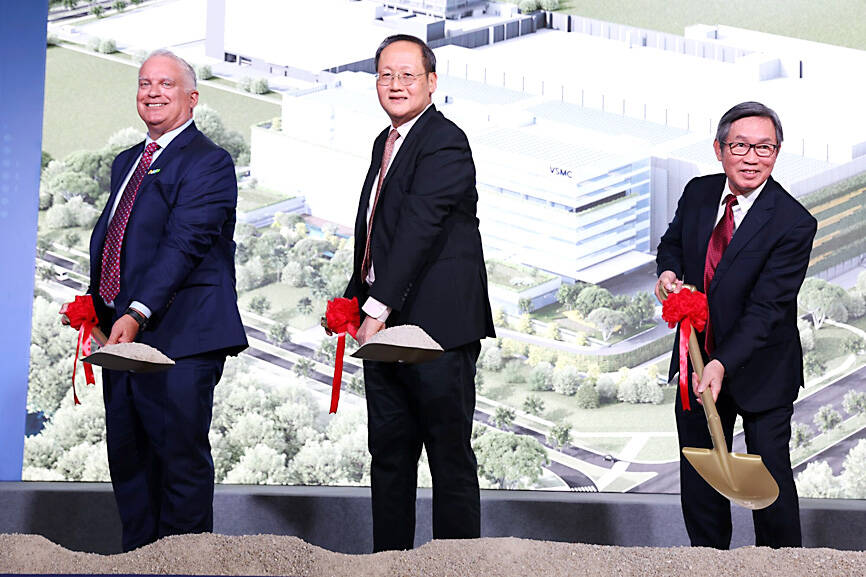VisionPower Semiconductor Manufacturing Co Pte Ltd (VSMC), the joint venture between Vanguard International Semiconductor Corp (世界先進) and NXP Semiconductors NV, yesterday broke ground on a 12-inch wafer factory in Singapore in a move to increase supply chain resilience.
The Hsinchu-based Vanguard’s first 12-inch fab in Singapore is to start initial production in 2027, and production is expected to expand to 55,000 wafers a month in 2029, it said in a statement.
Vanguard said it would consider a second-phase investment if the first fab proves successful.

Photo: Bloomberg
The venture, 60 percent owned by Vanguard, plans to invest US$7.8 billion in the fab and focuses on specialty IC foundry services, VSMC and Vanguard chairman Leuh Fang (方略) said in the statement.
The fab would support 130-nanometer to 40-nanometer technologies for the production of mixed-signal, power management and analogue products, targeting automotive, industrial, consumer and mobile markets, Vanguard said.
NXP president and CEO Kurt Sievers said the new fab would support the company’s growth and boost its geographic resilience at a competitive cost.
The Dutch company said earlier this year that it was seeking to diversify its manufacturing geographically to further enhance chip supply resilience together with its Taiwanese foundry partners amid the uncertainty of geopolitical tensions and natural disasters.

UNCERTAINTY: Innolux activated a stringent supply chain management mechanism, as it did during the COVID-19 pandemic, to ensure optimal inventory levels for customers Flat-panel display makers AUO Corp (友達) and Innolux Corp (群創) yesterday said that about 12 to 20 percent of their display business is at risk of potential US tariffs and that they would relocate production or shipment destinations to mitigate the levies’ effects. US tariffs would have a direct impact of US$200 million on AUO’s revenue, company chairman Paul Peng (彭雙浪) told reporters on the sidelines of the Touch Taiwan trade show in Taipei yesterday. That would make up about 12 percent of the company’s overall revenue. To cope with the tariff uncertainty, AUO plans to allocate its production to manufacturing facilities in

TAKING STOCK: A Taiwanese cookware firm in Vietnam urged customers to assess inventory or place orders early so shipments can reach the US while tariffs are paused Taiwanese businesses in Vietnam are exploring alternatives after the White House imposed a 46 percent import duty on Vietnamese goods, following US President Donald Trump’s announcement of “reciprocal” tariffs on the US’ trading partners. Lo Shih-liang (羅世良), chairman of Brico Industry Co (裕茂工業), a Taiwanese company that manufactures cast iron cookware and stove components in Vietnam, said that more than 40 percent of his business was tied to the US market, describing the constant US policy shifts as an emotional roller coaster. “I work during the day and stay up all night watching the news. I’ve been following US news until 3am

Taiwan will prioritize the development of silicon photonics by taking advantage of its strength in the semiconductor industry to build another shield to protect the local economy, National Development Council (NDC) Minister Paul Liu (劉鏡清) said yesterday. Speaking at a meeting of the legislature’s Economics Committee, Liu said Taiwan already has the artificial intelligence (AI) industry as a shield, after the semiconductor industry, to safeguard the country, and is looking at new unique fields to build more economic shields. While Taiwan will further strengthen its existing shields, over the longer term, the country is determined to focus on such potential segments as

COLLABORATION: Given Taiwan’s key position in global supply chains, the US firm is discussing strategies with local partners and clients to deal with global uncertainties Advanced Micro Devices Inc (AMD) yesterday said it is meeting with local ecosystem partners, including Taiwan Semiconductor Manufacturing Co (TSMC, 台積電), to discuss strategies, including long-term manufacturing, to navigate uncertainties such as US tariffs, as Taiwan occupies an important position in global supply chains. AMD chief executive officer Lisa Su (蘇姿丰) told reporters that Taiwan is an important part of the chip designer’s ecosystem and she is discussing with partners and customers in Taiwan to forge strong collaborations on different areas during this critical period. AMD has just become the first artificial-intelligence (AI) server chip customer of TSMC to utilize its advanced